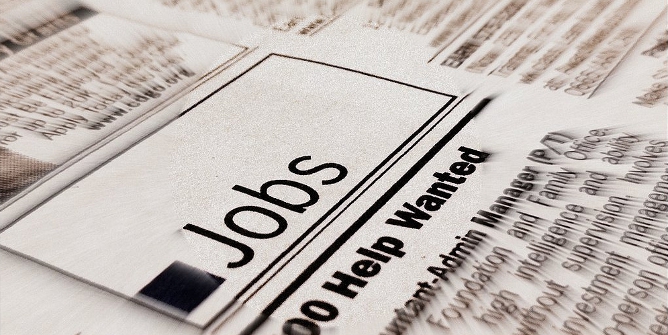 Donald Trump scored a stunning victory over Hillary Clinton on Tuesday. This is an election that political analysts will be debating for some time to come. How did this happen and what does Trump’s victory portend, both domestically and internationally? LSE US Centre Director, Peter Trubowitz, offers some provisional thoughts on these issues.
Donald Trump scored a stunning victory over Hillary Clinton on Tuesday. This is an election that political analysts will be debating for some time to come. How did this happen and what does Trump’s victory portend, both domestically and internationally? LSE US Centre Director, Peter Trubowitz, offers some provisional thoughts on these issues.
What explains Trump’s victory?
Many things obviously: a politically vulnerable opponent, lower voter turnout, FBI Director Comey’s decision to reopen the investigation into Clinton’s emails, among other things. But at the end of the day, the single biggest factor was Trump’s ability to recognise and tap into a well of anger and resentment in the American body politik that others missed. Trump’s whole campaign was predicated on the assumption that there was a “missing white voter” — a large group of non-college-educated voters who had been sitting out presidential contests and would vote Republican if they were offered policies that spoke to their grievances about Washington, globalism, and multiculturalism. That theory was put to the test Tuesday and it held up. Exit polls show that white voters backed Trump 59 to 39 percent. But it was among the non-college educated blue collar voter (historically Democrats) that Trump’s strength proved decisive. He won that group 67 to 28 percent. This is what allowed him to capture pivotal Democratic states like Pennsylvania and Wisconsin and possibly, Michigan (the vote is still too close to call) and thus win the Electoral College while losing the popular vote. African-American and Latino voters voted overwhelmingly for Clinton, but the numbers were well off Obama’s share in 2012 and were not enough to compensate for Trump’s strength among white voters. Indeed, despite Trump’s inflammatory rhetoric about Mexican-Americans, he won 29 percent of the Latino vote. Fifty percent of millennials supported Clinton, but that is 5 percent less than backed Obama four years ago. In the end, Trump’s gains among white voters, especially in rural America, were just too much for Clinton’s strength in the big urban parts of the country to overcome.
What will Trump and the Republicans do with their victory?
The Republicans are in a strong position to initiate some big changes on the domestic policy front. Trump has called for deep tax cuts, repealing Obamacare, and turning Medicaid into block grants for states, which would leave it to the mercy of many Republican state governors. These are policies that Paul Ryan and other conservative Republicans in Congress can easily support. On the spending side, Trump has been calling for increased defence spending and especially, infrastructure spending (e.g., roads, bridges, airports). The former will enjoy broad support among conservative Republicans. The latter will find more favour with Democrats, but also with many of those non-college educated voters who came out to vote for Trump yesterday. We might see Trump push this as a way to soften the blow that comes from any efforts to rollback entitlements.
Trump’s victory also puts him in a position to initiate change on the international front — something he talked a lot about on the campaign trail, and that puts him at odds with many Republicans in Washington. In particular, Trump has taken aim at free trade agreements, liberal immigration policies, and security alliances like NATO. I think he has more running room here than many in Washington believe, especially when it comes to trade matters. While Republicans like Paul Ryan are free traders, the exit polls in key states like Michigan and Pennsylvania (which effectively put Trump over the top in the Electoral College) show that a majority of rank and file Republicans oppose free trade agreements like NAFTA, TPP and TTIP. Ryan and his fellow Republicans on Capitol Hill will need to tread very softly here. The Speaker of the House might conceivably try to push Obama’s TPP trade deal through during the lame duck session of Congress. But such a move entails risks for House Republicans in the wake of Trump’s victory. It also assumes that Ryan not Trump will be setting the Republican agenda — a big assumption, I think.
What practical effect will Trump’s victory have internationally?
Given Trump’s attacks on America’s long-standing security ties in Europe and Asia, US allies have ample reason to worry about the credibility of America’s commitments to their security going forward. The question they will be asking from Seoul to Berlin is not whether Trump will make good on this threat or that threat. The question that is already being asked is whether they should be cutting their own deals with the most powerful countries in their respective regions – with China in East Asia, or Russia in Europe, and Iran in the Middle East. Meanwhile, Beijing and Moscow will be looking to see whether Trump’s victory means that Washington will be willing to concede ground internationally in return for concessions on other issues (e.g. allowing Beijing greater sway in Asia in return to trade concessions). Trump may or may not make good on his plans to pressure America’s allies to do more for themselves. We can’t know; I doubt Trump knows himself. But the mere fact that Trump is in the White House will give friend and foe alike reason to rethink their options.
Featured image credit: Gage Skidmore (Flickr, CC-BY-SA-2.0)
Please read our comments policy before commenting
Note: This article gives the views of the author, and not the position of USAPP– American Politics and Policy, nor of the London School of Economics.
Shortened URL for this post: http://bit.ly/2fgO2RL
______________________
 Peter Trubowitz – LSE US Centre
Peter Trubowitz – LSE US Centre
Peter Trubowitz is Professor and Head of International Relations, and Director of the LSE’s US Centre. His main research interests are in the fields of international security and comparative foreign policy, with special focus on American grand strategy and foreign policy. He also writes and comments frequently on U.S. party politics and elections and how they shape and are shaped by America’s changing place in the world.







Having lived in the US four years taught me that in any country´s politics there is more than meets the eye. Let´s respect the Americans choice and hope that things go well for their country and the world.
There is always a lot of froth in the days following an election. Many seem to have missed the fact that, apart from his political views (and he was once a Democrat), he must be quite a capable businessman to have built up the business empire he has.
He is basically a radical Republican with isolationist tendencies. There is nothing new about that (think the period between the two World Wars). Why should the USA put it’s soldiers and money on the line to maintain world peace in a post-Communist world? Each region of the world should sort out it’s own problems, with the US and the international community coming in “in extremis”.
He therefore seems to me (as someone who is a Democrat at heart) that he is an updated version of Ronald Reagan for a globalised world. Reagan surprised everybody, and Trump has the capacity to do the same. His acceptance speech on Wednesday morning would seem to bear this out.
Why has the world being shocked by Trump …is it because the working underprivileged class has finally woken up to the fact that democracy should advocate economic change for the masses via the ballot box. Isn’t that a good thing ? The worrying fact is we are putting democracy in the hands of a man who has throughout his campaign shown his darker side. Yes we ought to give him a chance, however how quickly will the working class wish to see that change, when years of globalisation, with both it’s pros and cons has created the swamp Trump has talked about in his campaign. Will undoing elements of globalisation make America great again and if so when is society going to feel its effects. On the global area,Trump is challenging the nature of NATO, trade with the new emerging nations etc, are there many waves to come ? America always wanted to have its influence all round the world, to prove its global power. The world has seen it’s impacts for the last few decades. This global influence hasn’t worked for the average working class American and Trump knows that. Isn’t change a good thing ?